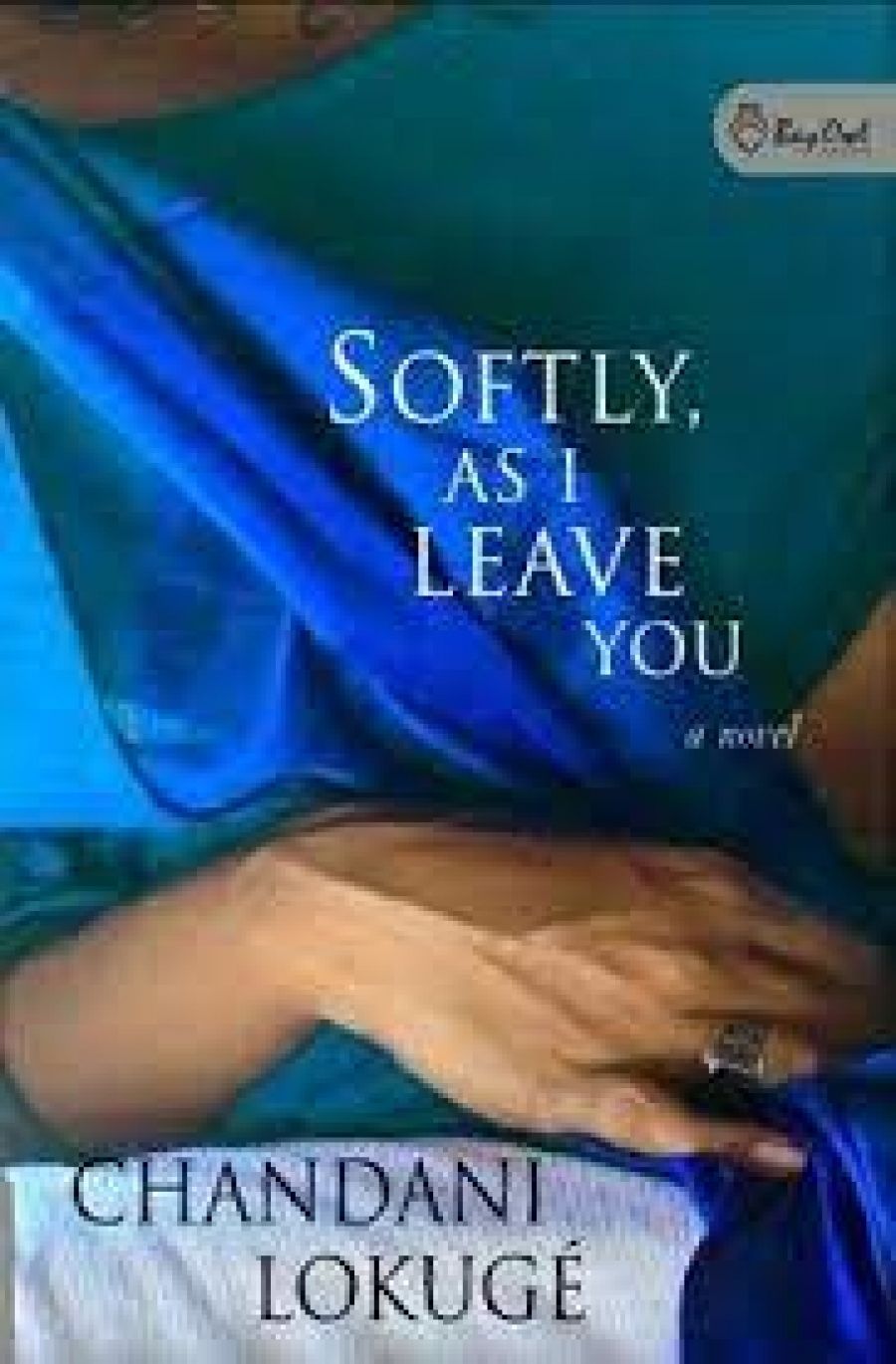
- Free Article: No
- Contents Category: Fiction
- Review Article: Yes
- Online Only: No
- Custom Highlight Text:
A treacherous beauty pervades Chandani Lokugé’s third novel, a tragic story of loss and squandered love. Chris Foscari, owner of a rarefied specialist bookshop in Melbourne and son of an Italian father and an Australian mother, is married to the outrageously beautiful Sri Lankan Uma, whom he met when she was studying in Melbourne. They have a teenage son, Arjuna, who is also blessed with unusual grace, at least in his mother’s eyes:
- Book 1 Title: Softly, As I Leave You
- Book 1 Biblio: Arcadia (Australian Scholarly Publishing), $24.95 pb, 252 pp, 9781921875410
She drank in the unusual and charming contradictions of his face with a woman’s eyes – shapely lips and strong jaw, shock of coppery-black hair, feminine thick-lashed hazel eyes. And the glowing golden skin that made him all the more striking.
Such extravagant beauty in one so young seems to invite the envy of the gods, as Iris Murdoch might say, especially in the highly charged world of a novel like this, and indeed Arjuna is soon in dire peril.
Chris and Uma married for love, in defiance of her patrician and highly conventional parents, who wanted her to return home and marry a Sri Lankan of their choosing; they have never forgiven Chris. He, in turn, cannot forgive them for their ‘meticulously polite and relentlessly cold’ behaviour on a visit early in their marriage, and has never returned, although Uma has stayed in close touch and visits them often with Arjuna. She brings him up to identify himself as a Sri Lankan, steering him – away from his spontaneous interests – towards Sri Lankan topics for school projects, and encouraging his interest in Sri Lankan causes. Chris, on the other hand, cares little about his Italian ancestry and regards himself as an Australian. His uneasiness about Uma’s insistence that Arjuna be constantly kept aware of the latest news from her troubled homeland is one of many things that cause conflict and distance between them.
Uma’s beauty is strangely like a disability; the novel begins with a moment of telling self-regard:
Rubbing her eyes, Uma awakened to a light-filled bedroom …
Uma stretched and rose languidly out of the quilt. In the full length mirrors opposite she saw herself – her honey-complexioned face and shoulders framed by black hair against the gold of the quilt and the green in the window. The mirrors softened the light, and ensconced her in a private world and she was lost in it for a moment – introspective and intense – like in an intimate kiss.
Not many mothers of nineteen-year-old boys would enjoy their reflection in the mirror first thing in the morning. Uma is used to being admired: it was ‘second nature’ to her, ‘and she blossomed in its warmth’, but it leads her to indulge in a perilous two-year affair with a married man, which has disastrous consequences she never really understands. When she ends it, her lover’s ‘devastation rubbed into her soul like balm. She cleaved to it; it gave her strength.’ Her son writes a story for a university class: ‘Sometimes my mother’s beauty saddened me in ways that I can’t explain. It had to do with my father, I would think as I grew up, resentment building up in me, and that’s why she could not love us, as we wanted her to.’ Uma does love her son, from the moment she perceives herself in him – ‘his lips were hers, and the shape of his eyes. And she took him in her arms – in love as with no one else, and forever.’ Arjuna has a girlfriend, Jane, who is mentioned in passing only a few times in the novel, though his point of view is often the focus of the narration: his mother is clearly her powerful rival, and plain Jane stands little chance of competing. The point of view is often Chris’s, too, but he is self-effacing – ‘his own heartbroken self played no part in his thought process – it encompassed only the others whom he loved more than himself’. Uma’s self-absorption leaves little oxygen for this rather pallid figure, both in the narrative and in his characterisation.
Lokugé’s prose is filled with exquisite imagery and melancholy. She is constantly searching for the perfect metaphor – a short-lived plant growing in a sealed glass jar, unwary travellers stranded in quicksands. Gritty realism has no part to play in this world of heightened emotions. Chris’s bookshop, in Lygon Street, intriguingly named Ekphrasis, effortlessly supports his implausibly lavish lifestyle, with overseas trips at will and ‘an old Californian bungalow’ with a beautiful garden. The Sri Lankan scenes, with all their emotional difficulties, are filled with the romance of the exotic:
Suddenly the forest opened up and he was on the bank of the river. From there he absorbed the spectacularly lush landscape – the misty grey-blue mountains in the far distance, the deep verdure of the forests in mid distance and up close, the crystal waterfall splashing down a rocky precipice … Boys swam noisily in the river, cutting the water in quick frog strokes. A handsome young boatman rowed his boat to the edge of the bank for a pretty young girl … Some old crones laundering their clothes further up the banks admonished them with cackling voices.
Softly, As I Leave You abounds in hidden warnings against the seductive dangers of beauty. Dreams and absences assume the place of genuine human bonds. The novel’s message is a reproof to Keats – beauty is illusion, not truth at all.


Comments powered by CComment